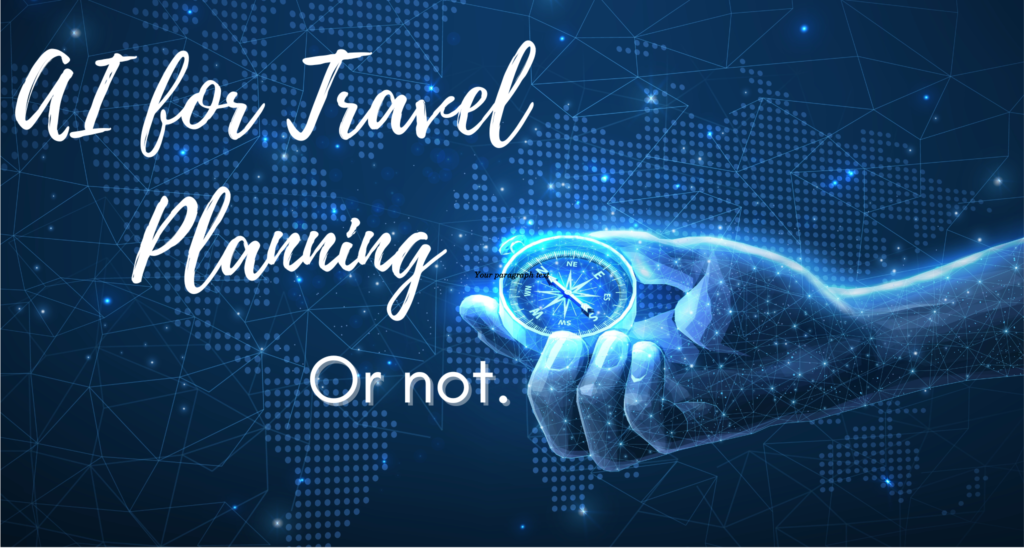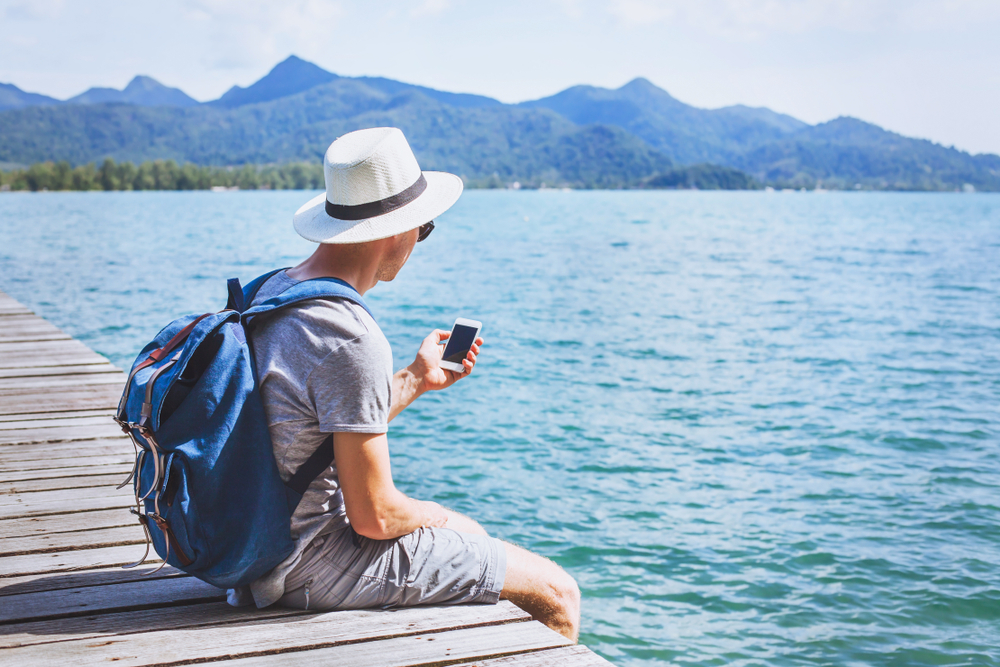
AI for Travel Planning. Or not.
I was taken aback when my friend Cathy, an experienced traveller and travel writer, told me that she used AI to plan her upcoming trip to Argentina. Trip planning is top of mind for me as I finalize details for upcoming trips to Morocco and to Japan. I was considering writing a blog post on travel planning, thinking of offering useful suggestions extolling the joys of the first stages of a trip before you leave home. I was curious what tips a fellow expert might have, which guidebooks or sources she used. Her answer surprised me because I was not aware or at least never thought that AI might be a tool. My other immediate reaction was “why?”.
Of course I am aware of artificial intelligence but I won’t pretend to be well versed. I skim headlines, pick and choose what to read in more depth, gravitating to those pieces which focus on the negative, express caution, point out unexpected consequences of the rush to embrace it. I am not resisting AI, but I am not an early adopter and worry that we are hurtling blindly towards something ultimately bad for us. Aside from another friend who is building a new business using AI in public consultation, I had not really talked in detail with anyone about how they are using AI. Or not.
Assessing AI for trip planning
Mindtrip, GuideGeek, Layla, Vacay and Wonderplan are AI trip planning apps which show up at the top of a Google search and which were mentioned in a few recent articles reviewing AI for travel planning. All but one of the articles or posts were generally positive. While pointing out flaws and limitations, the writers anticipated, sometimes eagerly, improvements and greater usage. I learnt a lot. I became more willing to consider the merits and benefits. However, my skepticism and biases were confirmed.
AI is not a full-service vacation planning tool.
Travel has become one of the most popular use cases for AI that Google, Microsoft, and OpenAI like to point to in demos, and firms like Tripadvisor, Expedia, and Booking.com have started to launch AI-powered vacation-planning products too. While AI agents that can manage the entire process of planning and booking your vacation are still some way off, the current generation of AI tools are still pretty handy at helping you with various tasks, like creating itineraries or brushing up on your language skills.
There it is. It is just one, and I would say limited, tool with which to build your travel experience. It seems to work well as an idea generator, a way into the overwhelming range of possibilities for travel. A strength seems to be itinerary generation. Many of the writers tested AI trip planning apps by asking the app to create a weekend getaway in the city where they lived or a location that they knew well. It seems that the AI agents did a decent job, although the locals knew more details, corrected errors and identified some special things that AI missed. They also pointed out hallucinations, which are things that AI just makes up.

I spent a little time on the free version of Mindtrip, not wanting to create an account to really test its “personalized” recommendations. The chatbot showed an example request for a road trip from Amsterdam to Madrid. Pretty light and I am not sure how practical, but maybe asking deeper and deeper questions would end with something usable. The Explore section offers popular itineraries created by app members. There was one for Morocco – three days in Marrakesh. This gave me pause because it reminded me of the sidebar sections with proposed itineraries in guidebooks. Which reminded me of the contentious issue of training AI tools by scrapping information from the Internet, regardless of origin, ownership or copyright. Does that include e-book editions of guidebooks? A good guidebook is not only well written, well organized and fact checked, but it requires people to incur the expense of travelling to the destinations, and payment for the writers, researchers and photographers. For that matter the Mindtrip members sharing photo rich itineraries spent money to enjoy those meals, stay in the accommodation, visit museums. Why should AI get all that for free? Sure, we get ideas and information from a multitude of sources, some of which may benefit us financially, but the scale of what AI takes is orders of magnitude more.
And why are we asked to train AI? The onus falls back onto the user. If poor information is offered, it is our fault that we did not pose good or the right questions, rather than the tool being faulty. A National Geographic article suggests correcting wrong answers. It is ironic that while we use AI for trip planning because we don’t have time, we are supposed to take the time to improve AI. Without delving into the question of who is making money from AI.
If we don’t have time to plan, how do we have time to travel? Admittedly narrow-minded and not compassionate regarding the circumstances of those who are squeezed between families, work and a multitude of other obligations but really, really need a holiday. Perhaps AI is useful to generate a weekend city break or a short escape for a few days away from it all. But if you are too busy to plan a vacation, why not invest your limited time in selecting a full package tour from a knowledgeable and reputable tour operator, perhaps an active holiday or a tour which focuses on cultural connections and sustainability. If you want a resort, spend the time to find a small, locally owned resort in a less travelled location. If you incline to cruises, spend your time to seek out small ships which emphasize wildlife viewing and offer a more intimate experience.
Are people just too eager not to think, to be told what to do? I have noticed the proliferation of articles with titles that include “this is how to do it” or this is how to fix it” or similar. Were there always so many instructional videos, sometimes on the most basic of things? An AI chatbot on The Weather Network irritates me daily by asking questions that I am capable of answering and for which it cannot possibly know the response, like “should I go for a hike today?”. A guest on one of my recent rowing tours emailed me before the trip start, asking what the weather would be and what she should pack. Are people gravitating to AI for trip planning because they like having everything laid out for them, no need to spend time learning, evaluating and deciding for themselves? And what happened to being prepared for the unexpected, for the possibility that the restaurant that you have set your heart on experiencing is closed for holidays, that a road is washed out by floods or the highly rated tour guide is giving you a “personal” guided walk with 20 other people? More importantly, what happened to the thrill of discovery, the frisson of the unknown, the pleasant anxiety of going beyond what you normally do, having your boundaries pushed, the wonder of unexpected experiences?

Without exception, all the articles I read about AI for travel planning admonished the reader to be careful about AI hallucinations and to always check the details with a reliable source. Good advice but what exactly is a reliable source? Especially when so many are now powered by at least an element of AI. Some sources seem to be becoming more unreliable. On a recent two-month trip in Europe I encountered inaccuracies in Google maps multiple times in different countries, especially regarding opening hours, travel time or even if a business or museum still existed. Seems like so much else in our lives, it is all about the source and quality of information that you access and believe in and act on.
There is debate whether AI for trip planning contributes to over-tourism by driving more and more people to the same places. As can social media and guidebooks. An opposing perspective is that asking for underrated or off-the-beaten path suggestions directs travellers away from the crowds. Unlike review-driven sites like Trip Advisor or Yelp, AI scrapes information from many sources on the internet, potentially exposing people to responsible and sustainable travel options that they might not otherwise know of or consider. But you don’t need AI. The newly updated adventure.travel website seeks to not only inspire travellers with unusual and fascinating destinations but also to connect their planning with reputable tour operators and suppliers.
Then there is the carbon and environmental impact of all this AI trip planning. Travel is already fraught with guilt as we board flights, stay in apartments for three nights in cities with housing crises, chug bottled water or clamber onboard mega cruise ships stacked 11 stories high. Generative AI (along with all our internet searches and cloud computing) is resource hungry, with data centres requiring more and more energy and water. What is the environmental impact of your AI app request for a three-day itinerary in Marrakesh? Minor, but do we really need to burn resources for a small and limited tool when there are other ways?
Other ways to plan your trip
After learning about AI for trip planning, I went back to Cathy to find out exactly how she and her friend used it to plan her trip to Argentina. Not as extensively as I had first thought, and very consistent with the articles that I had read. They had a set timeframe and were looking for a destination that their husbands were not interested in. Google searches and phone conversations narrowed options to three possibilities. Once they decided on Argentina, they used an AI tool to propose itineraries for 20 days for two women in their 60s who like hiking, biking, birding, wine and food, plus a few other criteria. Guidebooks and blog posts supplemented the planning along with other platforms such as Airbnb. They intend to seek recommendations once there and are open to the adventure of travel.
Jen Murphy posed the question in Outside Online “Can AI Be Trusted to Plan Your Next Trip?”. Her conclusion aligned with my thinking. She was impressed with the speed in which a “loose plan” could be generated and would consider it as a starting point for well-travelled destinations. But, as she puts it, she will stick to her Luddite ways, primarily relying on word-of-mouth recommendations. I went back to a blog post I wrote in 2018, Top Ten Travel Tips. Surprisingly still current. If I were to republish it today, to Tip #1 I would add trusted blog writers, in-depth google searches beyond the first and second pages of results, and fact-checked newspaper articles (I get especially good ideas and information from The Guardian). I would change some of the apps mentioned in Tip #4.

My circumstances are unusual. I have a lot of experience planning trips, having done so professionally for almost 30 years through my various adventure travel companies. For Morocco I am travelling alone. I only need figure out what intrigues me, how I want to spend my time, where I want to go and stay. I am someone comfortable with a fair bit of uncertainty. And I have done a lot of travelling. I have a lot of on-the-ground experience in many different countries and circumstances.
At times I find travel planning hard. But mostly I enjoy it, love it. It’s exciting to get guidebooks or picture books from the library or bookstore, crack them open and start to get a sense of a country, a feel for a destination. It’s a buzz to chance upon an article or blog post with an idea or location that I had never thought about. It’s a thrill to watch a plan evolve from vague ideas to a potential itinerary. It’s rewarding to consider various options and then know, absolutely know, exactly which one to choose. It is satisfying to find places to stay, things to maybe do, perhaps a recommended café to seek out. To have a plan with key things addressed but which remains rich with possibilities, open to nuances, ready for exploration and the unexpected.
Ultimately if people travel in any way, it is mostly a good thing. I would like to encourage more travel of the conscious, sustainable, responsible, learning kind. It can begin with how you plan your trip. Sure, use AI tools judiciously if it helps you. Or not.
… it’s also not a complete solution to the age-old problem every traveler faces: figuring out how to engage with an unfamiliar part of the world, and the people who live there, in an enriching, meaningful way. Only human intelligence can accomplish that.
Afar

I doubt very much that AI could have planned that fabulous rowing trip we experienced in Dordogne. So many challenges! Trailer issues, COVID, weather….But your networking and experience came to the rescue every day. There’s no substitute for that level of knowledge that a experienced travel professional brings to the table.
Doris! Thank you very much for your kind comments!